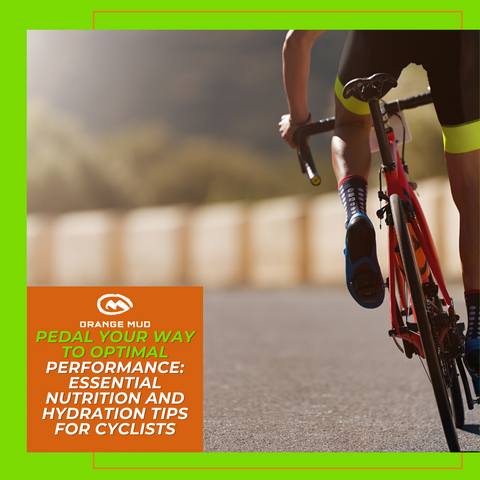Whether you are a beginner in the sport of cycling working towards becoming a professional or just enjoy riding a bike outdoors every weekend, it is important to know that proper cycling nutrition and hydration play vital roles in improving your athletic performance.
The nutrition that you get from food and adequate hydration of the body provides you with the necessary components of how to be the best cyclist you can be. Aside from helping you sustain your endurance and energy levels especially for long and challenging rides, a proper cyclist’s nutrition can help you prevent illnesses and injury, as well as keep you strong and healthy, so you can enjoy cycling even more.
As the saying goes, what you put into your body, you get out of it”., While it's true that cycling nutrition and hydration are not the same for everyone, and there are many factors that might affect the way you consume food and maintain a healthy lifestyle, one thing is consistent and that is if you focus on the nutrition and hydration that your body needs, you can enjoy cycling that much more and take your cycling skills to the next level. So, focus on how you can set your nutrition and hydration right and enjoy cycling more as you read this short guide.
Why are nutrition and hydration important?
Most cyclists nowadays tend to invest so much money in the latest bike model and new sets of shiny gear, but no matter how much money you might spend on these things can amount to a great nutrition and hydration plan for better cycling performance. Some cyclists often fail to create proper nutrition and hydration strategies because of the other, perhaps more exciting aspects of cycling, they tend to focus on.
Cycling, like any other sport, requires an adequate amount of carbohydrate, fluid, and nutrient (including electrolyte) intake to keep you in top shape and make training and racing easier on your body. Nutrition while cycling should be tailored to meet these needs effectively.
Basic cycling nutrition guide
For the best cycling nutrition guide, there are important things that you should always consider, especially if you have a diet plan: carbohydrates, protein, and essential minerals such as Vitamin C and Vitamin D on a daily basis help support your body while on the go. Foods rich in carbohydrates serve as your body’s primary fuel source while protein such as lean meats contribute to muscle support and repair. Don’t forget to add a selection of fruits and vegetables to your cycling meal plan as well to satisfy your body’s need for antioxidants. You can also consume food rich in carbohydrates during a race but not too much. Experts also recommend balancing your nutrient intake to your hydration.
Hydration for cyclists
It is important to note that proper nutrition will only work if you are well-hydrated. Hydration drives your endurance cycling nutrition energy. If you are dehydrated, the body will not function well as there is inadequate energy to spend. You may notice little changes in your performance, but it can be detrimental as you become more dehydrated.
Lots of water is key and it is also helpful to supplement with sports drinks or other beverages with electrolytes to replace those lost through sweat. Even on a cooler day when you do not sweat as much, it is still important to replace fluid so always have water with you! And, if it is too cold to drink cold water, sipping on warm water, broth, or herbal teas all count towards your hydration.
Nutrition and hydration are essential components of your cycling training and you need to work on finding out what nutritional balance will work best for you. Keep in mind that for every stage of your training, your body should be getting the amount of nutrition it needs to train and recover. Exploring cycling nutrition supplements can also help in achieving this balance effectively.

